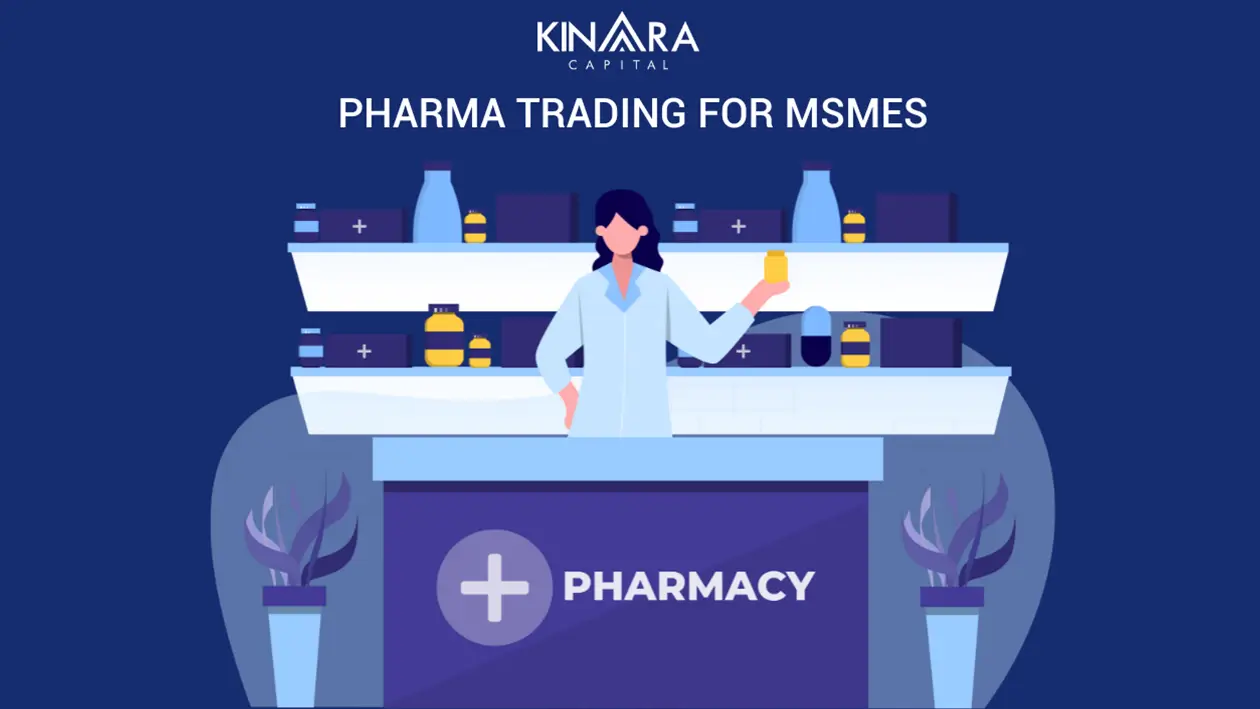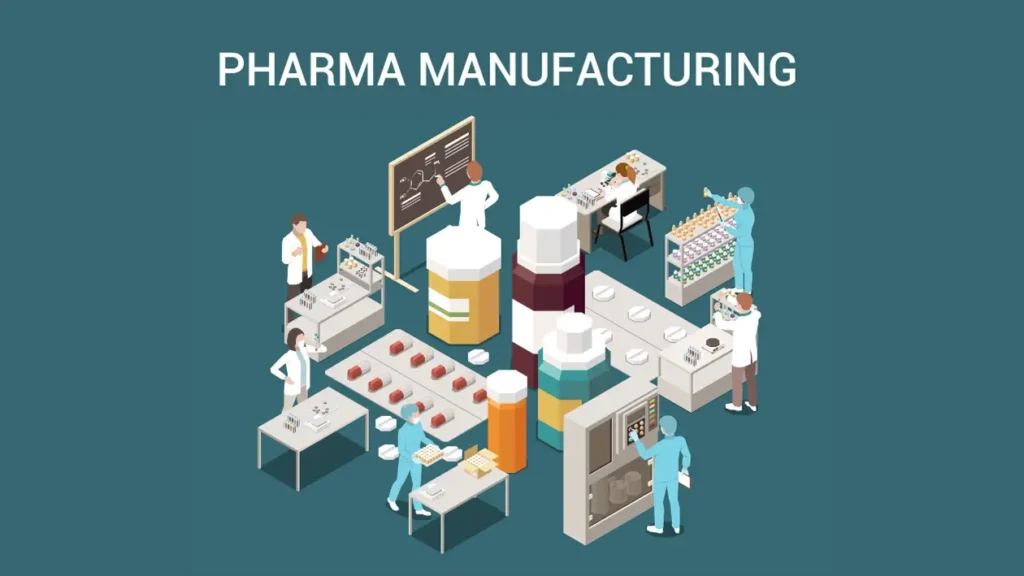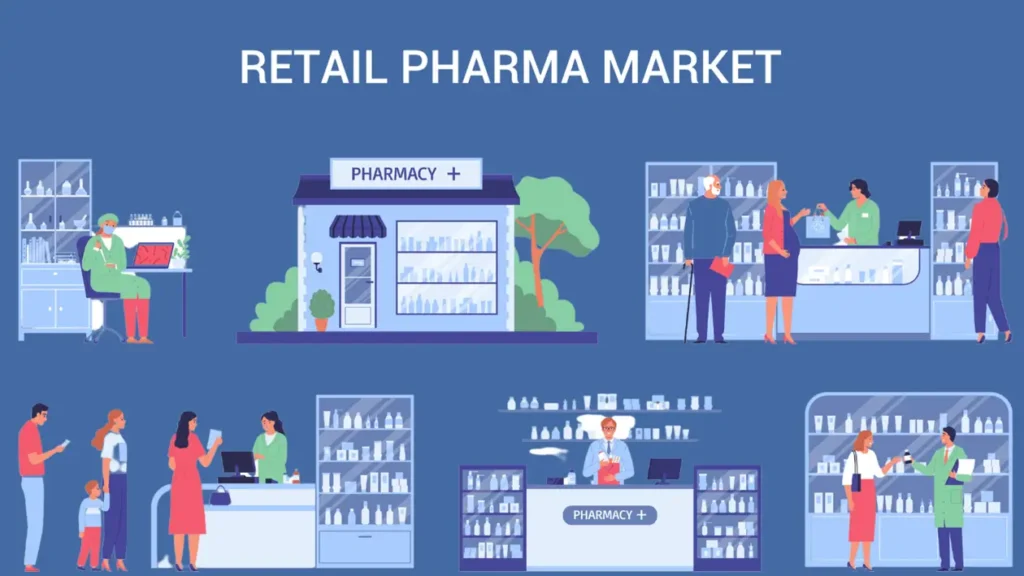
India’s economy is currently one of the fastest-growing in the world and is anticipated to keep expanding quickly. The need for healthcare services is therefore anticipated to rise. One of the key pillars of the Indian economy is the pharmaceutical sector, which is projected to expand at a compound annual growth rate (CAGR) of 12%.
The Indian pharmaceutical sector is currently estimated to be worth $50 billion, of which the export market accounts for over $25 billion. By 2030, the domestic market will reach $130 billion, with almost 60% of that amount coming from exports alone. The government is making a lot of effort to develop an ecosystem for innovation so that India can become a global leader in the development of pharmaceuticals, medical technologies and pharma trading.
The Indian Pharmaceutical industry has seen a CAGR of 9.43% over the past nine years and is now ranked third in terms of pharmaceutical production volume. Generic drugs, over-the-counter medications, bulk drugs, vaccines, contract research & manufacturing, pharma trading, biosimilars, and biologics are some of the primary elements of the Indian pharma industry. Furthermore, India has the most number of pharmaceutical manufacturing facilities that meet the USFDA standards and has 500 API producers which make up 8% of the global API market.
India is a primary global provider of various vaccines, supplying over 50% of global demand; 40% of generic demand in the US; and 25% of all medicine in the UK. The country’s domestic pharmaceutical industry includes a network of 3,000 drug companies and ~10,500 manufacturing units. India has a plentiful pool of scientists and engineers, which is allowing the industry to reach new heights. Presently, Indian pharmaceutical firms are providing more than 80% of the antiretroviral drugs used around the world to battle AIDS (Acquired Immune Deficiency Syndrome). India is aptly known as the “pharmacy of the world” due to the low cost and high quality of its medicines.
According to the Department of Pharmaceuticals, the Indian Pharmaceutical Industry has seen substantial development, from a turnover of around US $1 billion in 1990 to more than US $30 billion in 2015 including exports of US $15 billion. Ranking 3rd in terms of volume of production and 14th in terms of value, the country accounts for 10% of the world’s production by volume and 1.5% by value. In a global context, it stands 4th in generic production and 17th in export value of bulk actives and dosage forms.
By taking advantage of the evolving environment, the Indian Pharmaceutical Industry has made significant strides in infrastructure and technology base advancement, along with the development of a wide range of products. Bulk drugs belonging to all major therapeutic groups requiring complex manufacturing techniques can now be produced, as well as formulations in many dosage forms in Good Manufacturing Practices (GMP) compliant facilities. This is all possible due to the strong scientific and technical manpower, as well as the pioneering work in process development.
Pharmaceuticals is a booming industry in India, and the MSME sector has a significant role to play in its growth. Manufacturing MSMEs in the pharma sector are involved in the production of various types of drugs, ranging from generic medicines to life-saving drugs. These businesses contribute significantly to the overall economy of the country by generating employment opportunities and providing quality medicines at an affordable cost.
MSMEs in the pharma sector are responsible for the production of various essential drugs, including those for chronic and lifestyle diseases, and are actively involved in research and development to innovate new drugs. The sector has been growing rapidly, with more and more players entering the market, leading to increased competition and a push for quality and efficiency in the production process. The Indian Economic Survey 2021 forecasts that the local market will expand thrice its current size in the coming decade. India’s domestic pharmaceutical market attained a value of US$ 42 billion in 2021 and is estimated to escalate to US$ 65 billion by 2024, eventually achieving a range of US$ 120-130 billion by 2030.
India has a significant role in the global vaccine production scenario, contributing to 60% of the market. The country supplies as much as 70% of the WHO’s requirement for Diphtheria, Tetanus and Pertussis (DPT) and Bacillus Calmette–Guérin (BCG) vaccines, along with 90% of the WHO’s demand for the measles vaccine. As per IBEF, the states of Maharashtra, Gujarat, Karnataka, Uttar Pradesh, Delhi NCR, Tamil Nadu and Telangana are the major contributors to the pharmaceutical industry in India.

The drugs are divided into generic, OTC, and patented drugs according to type. Generic drugs have the same chemical structure, dosage effects, side effects, and administration routes as patented ones.
According to Pharmacy Retail Market in India 2022, during 2021, generic drugs had a 71% share of the market, and OTC drugs, which could be purchased without a prescription from a medical professional, accounted for 18.18%. Patented drugs, created by international pharmaceutical companies to be employed in a range of therapeutic areas like oncology, anti-infectives and cardiac treatment, had a market share of 10.82%.
Retail pharmacies are a crucial component of India’s healthcare infrastructure and are now thriving. There is a heightened reliance on retail pharmacy outlets for a wide selection of wellness and generic pharmaceutical products.
A considerable concentration of organised retail pharmacy stores can be found in India’s urban and semi-urban areas. Prominent industry players like Appolo Pharmacies Ltd., MedPlus Health Services Private Ltd. and others maintain a strong presence in the country’s retail pharmacy industry.
Small retailers play a significant role in the pharma trading industry in India. These small retailers, often referred to as chemists or pharmacy stores, are an essential part of the healthcare ecosystem in the country. They give the general public easy access to medications and healthcare items, especially in remote regions where access to healthcare facilities is limited. These neighbourhood-based small businesses make it simpler for individuals to quickly and efficiently get their hands on prescription medications and OTC medicines.
Small sellers play a crucial role in connecting pharmaceutical firms, medical providers, and customers. They act as intermediaries by procuring medicines from wholesalers and stocking a wide range of pharmaceutical products. To ensure safe and appropriate use, these sellers offer their customers useful guidance on the use, handling, and potential adverse reactions of medications.
These organised retail pharmacy chains currently only account for 8 to 10% of the market, and most of them are centred in urban regions. Therefore, there is a tremendous opportunity for pharmacy stores to broaden their distribution networks throughout the entire nation. The organized retail pharmacy sector was estimated to be INR 134.21 Billion in 2020 and is projected to reach INR 370.39 Billion by 2026.
The unorganised segment in India’s pharmaceutical sector includes individual-owned and managed local medical shops. The unorganised retail pharmacy, the conventional forms of low-cost retailing, such as neighbourhood drugstores run by local proprietors with assistance from sales employees.
The investment in an unorganised retail pharmacy will differ from that in an organised retail pharmacy because it will be in a different setup and location. As per a white paper published by the International Journal of Development Research (IJDR), in 2016, 90 lakh unorganised pharmacy retailers, or 86% of all domestic sales in terms of money, make for the majority of the retail pharmacy market in India, which is worth INR 94368.7 crore. The unorganized sector was valued at INR 1548.55 Billion in 2020 and is expected to hit INR 2390.20 Billion by 2026.
The revenue of the online retail sector totalled INR 38.15 Billion in 2020 and is likely to climb to 317.87 Billion in 2026. The online retail channels sector is the quickest developing, due to the rise in the number of internet users and advancement in technology. It was valued at 38.15 Billion in 2020 and is predicted to reach 317.87 Billion in 2026, advancing at a CAGR of 44.44%.

The retail pharma trading market is divided into three parts: bigger players, small retailers, and online sales. Local medical shop owners made up 88.70% of the market in 2021, while the organized sector, which includes large companies approved to sell medications and registered for sales and income tax, made up 8.50%.
There has been an increase in online pharmacy retail with a 2.80% market share. As internet users and technological advances continue to increase, this sector is projected to expand at a CAGR of 44.34% between 2022 and 2026. The retail pharma trading market in India can be broadly categorized into the following types:
These are standalone pharmacies operated by individual pharmacists or small pharmacy owners. They are typically small-scale operations and are spread across various neighbourhoods in cities and towns.
Chain pharmacies are retail pharmacy outlets operated by large companies that have multiple stores across different locations. Examples of chain pharmacies in India include Apollo Pharmacy, MedPlus, and Religare Wellness.
Many hospitals in India have their own in-house pharmacies to cater to the medication needs of patients. These pharmacies are primarily focused on serving the hospital’s patients and may also provide medication to outpatients.
With the growth of e-commerce in India, online pharmacies have gained popularity. These are digital platforms that allow customers to order medications and other healthcare products online and have them delivered to their doorstep. Examples of online pharmacies in India include 1mg, PharmEasy, and Netmeds.
The government operates several pharmacies across the country to provide affordable and accessible medication to the public. These pharmacies are often associated with government hospitals, health centres, and public health initiatives.
Setting up a pharmacy shop in India can be a lucrative business opportunity, as the demand for medication is always high. However, there are several legal and regulatory requirements that must be met to establish a pharmacy business in India. Here are some important factors to consider when setting up a pharmacy shop in India.
In India, pharmacies must obtain several licenses before they can operate. The most important licenses are the Drug License and the Retail Pharmacy License. These licenses are issued by the State Drug Control Department, and the process for obtaining them can vary depending on the state where the pharmacy will be located. It’s essential to understand the requirements and comply with them to avoid legal issues.
Choosing a suitable location is crucial for a pharmacy business. It should be easily accessible and located in a busy area where there is a high demand for medication. The store setup should be well-organized, with proper shelving and storage for medicines, and have a clean and hygienic environment.
The pharmacy shop should stock a variety of medicines that cater to the needs of the local population. It’s important to ensure that all medicines are procured from authorized distributors and have valid expiry dates. The pharmacist should also have a good knowledge of the medicines in stock and be able to provide advice to customers.
The pharmacy should be staffed with qualified personnel, including a registered pharmacist who has a degree in pharmacy. In addition, the pharmacist should have a good understanding of the local language and be able to communicate with customers effectively.
Once the pharmacy is set up, it’s essential to market and promote the business to attract customers. This can be done through various means, such as print and online advertising, offering discounts and promotions, and maintaining a good reputation by providing excellent customer service.
To manage the overall inventory and set up the establishment, entrepreneurs need finance options like working capital loans to fulfil their business requirements. Working capital loans can be used in a variety of forms such as to buy inventory, construct the workspace, hire people, and pay wages.
Opening a medical shop in India requires several documents to be submitted to the regulatory authorities. The following are some of the documents that are required to open a medical shop:
A Drug License is a mandatory requirement for opening a medical shop in India. The license is issued by the State Drugs Control Department and is valid for a period of 5 years. The following documents are required for obtaining a Drug License:
A medical shop must be registered under the Goods and Services Tax (GST) regime. The following documents are required for GST registration:
Food Safety and Standards Authority of India (FSSAI) registration is mandatory for those who sell food supplements, vitamins, and other related products. The following documents are required for FSSAI registration:
This license is issued by the local municipal corporation and is required for every business establishment. The following documents are required for obtaining a Shops & Establishment License:
A No Objection Certificate (NOC) from the local Fire Department is required to ensure that the shop is compliant with fire safety regulations. The following documents are required for obtaining a NOC from the Fire Department:
Pharma trading can be a profitable business opportunity for MSMEs in India. Here are some benefits of pharma trading for small business owners:
Setting up a pharma trading business requires relatively low investment, as the business does not involve manufacturing. MSMEs can start with a small office and gradually expand as the business grows.
The demand for medicines is always high, and pharma trading can cater to the needs of the local population. MSMEs can stock a wide range of medicines and health-related products, which can attract more customers, resulting in higher sales and revenue.
Pharma trading offers a vast range of products to choose from. MSMEs can stock medicines for different ailments, health supplements, and other related products, providing customers with a one-stop shop for all their health-related needs.
The Indian government provides various incentives and schemes to promote the growth of MSMEs. MSMEs in pharma trading can benefit from these schemes and avail business loans at lower interest rates.
Pharma trading can create job opportunities for the local population. MSMEs can hire qualified pharmacists and support staff, providing employment opportunities and contributing to the local economy.
The pharma trading business offers flexibility in terms of location and working hours. MSMEs can set up their business in any location and operate according to their convenience, making it an attractive business opportunity for entrepreneurs who prefer flexibility.
Pharma trading can have a significant social impact by providing essential medicines to people at affordable prices. MSMEs can also support the local community by organizing health camps and awareness programs, promoting a healthy lifestyle.
The pharma trading market in India offers a plethora of opportunities for MSMEs. With the increasing demand for medicines and healthcare products, the pharma trading sector provides a platform for MSMEs to cater to the needs of the local population. The investment required to set up a pharma trading business, the availability of a wide range of products, government support, job creation, flexibility, and social impact are some of the key benefits that make pharma trading an attractive business opportunity for MSMEs.
With the right strategy and approach, MSMEs can establish a successful pharma trading business, contributing to the growth of the Indian economy. By providing essential medicines at affordable prices and supporting the local community through health camps and awareness programs, MSMEs in the pharma trading sector can make a significant social impact. Overall, the pharma trading market in India holds tremendous potential for MSMEs, and with the right business plan and execution, they can thrive in this sector.
However, the MSME pharma trading sector faces various challenges such as lack of access to capital, shortage of skilled labour, inadequate infrastructure, and lack of support from the government. The cost of setting up a pharma manufacturing unit is high, making it difficult for small businesses to compete with larger players in the market. Access to funding and credit facilities is limited, making it difficult for MSMEs to scale up their operations and invest in new technologies.
To address these challenges and provide MSMEs with access to formal credit Kinara Capital, an RBI-registered Systemically Important NBFC in India provides collateral-free business loans to small business owners in India. To avail a business loan, MSME owners can check their loan eligibility with no documents required in the myKinara App which is available to download from the Google PlayStore. The digitised platform gives them to choose their preferred vernacular language from the 7 language options available to navigate through the app. Once they clear the eligibility test and submit minimal documentation, the loan amount will be transferred to the applicant’s bank account.
To conclude, pharma trading can be a profitable business opportunity for MSMEs in India. With the high demand for medicines, government support, and flexibility, MSMEs can establish a successful pharma trading business and contribute to the local economy.